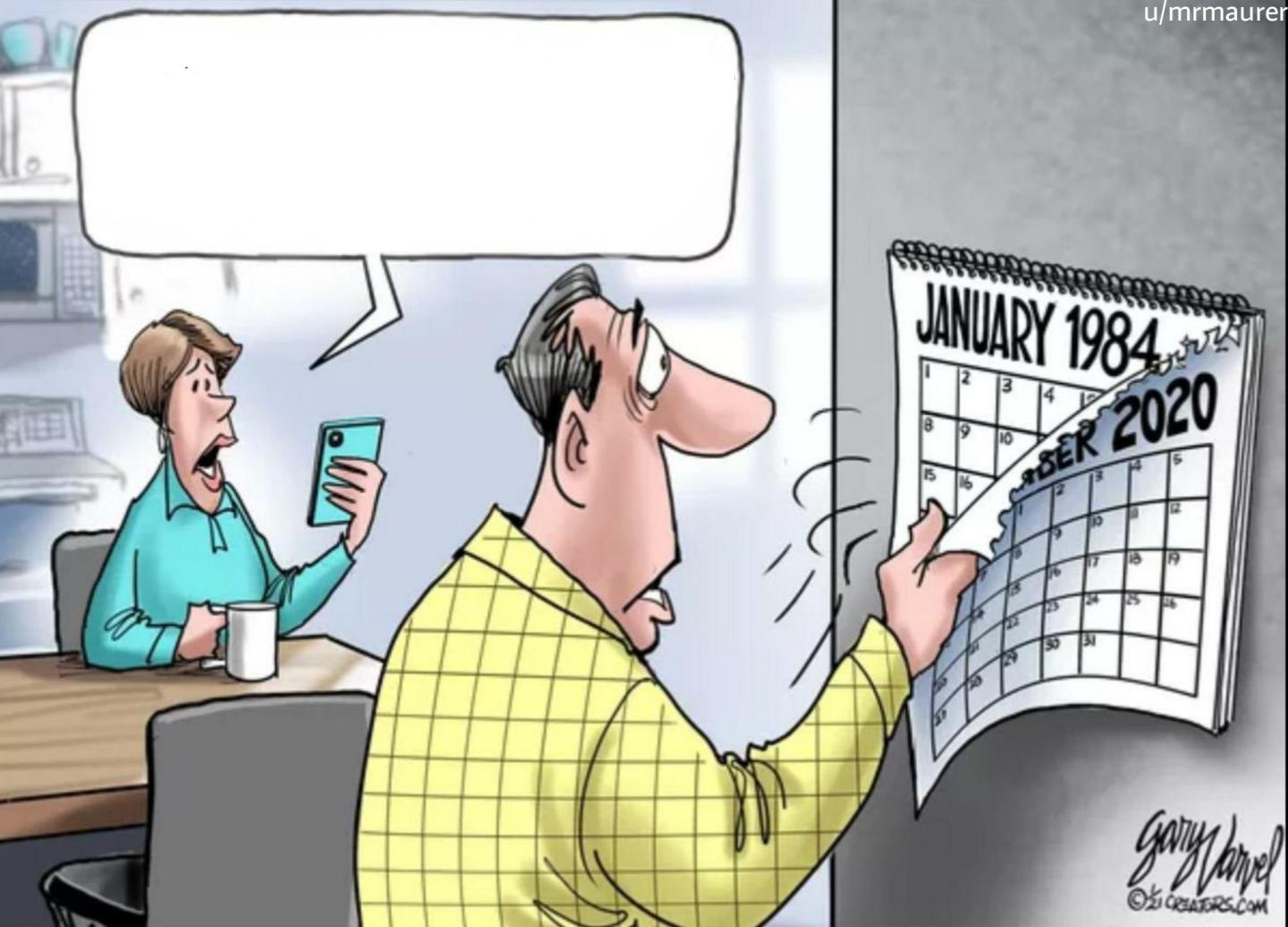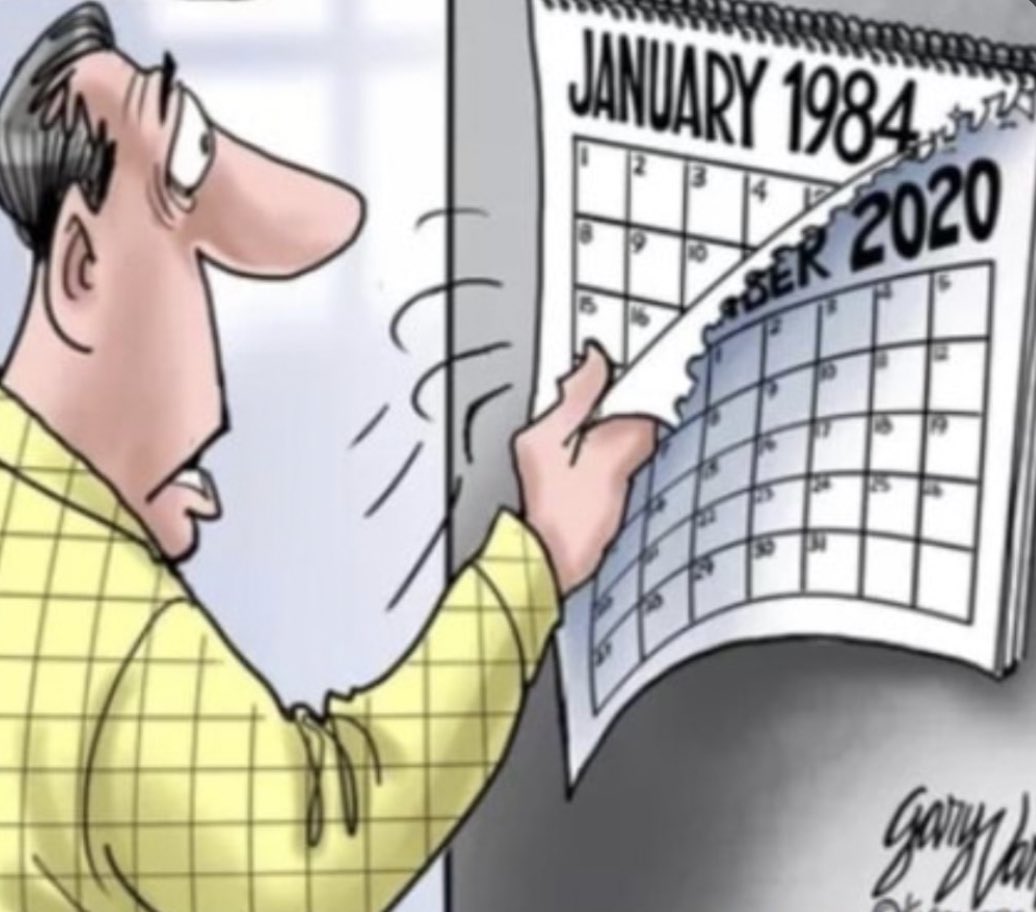The 1984 calendar meme has become a cultural touchstone, resonating with audiences across generations. From its origins to its widespread popularity, this meme has carved out a unique place in the digital landscape. Whether you're a history enthusiast or a casual internet user, the 1984 calendar meme offers insights into how historical contexts are reinterpreted in modern times.
This phenomenon is more than just a humorous image shared online. It serves as a commentary on how we perceive and interact with historical events in the digital age. The 1984 calendar meme is a testament to how internet culture can transform seemingly mundane objects into something extraordinary.
In this article, we will delve into the origins, evolution, and cultural significance of the 1984 calendar meme. By exploring its impact, we aim to provide a comprehensive understanding of why this meme continues to captivate audiences worldwide.
Read also:Addison Rae Leaks Exploring The Controversies Facts And Misconceptions
Table of Contents
- The Origin of the 1984 Calendar Meme
- Cultural Significance of the Meme
- Why the Meme Gained Popularity
- Common Variations of the 1984 Calendar Meme
- Impact on Internet Culture
- Historical Context of 1984
- How the Meme is Used Today
- Statistics and Trends
- Criticism and Controversy
- The Future of 1984 Calendar Meme
The Origin of the 1984 Calendar Meme
The 1984 calendar meme originated as a simple image of a calendar page from the year 1984. However, its simplicity belies the complexity of its meaning and the layers of cultural references embedded within it. The meme typically highlights a specific date or event in 1984, often juxtaposed with modern-day contexts.
Initially shared on platforms like Reddit and Twitter, the meme quickly gained traction due to its versatility and relatability. The year 1984 itself holds significant historical weight, making the meme a powerful tool for commentary and satire.
Evolution of the Meme
Over time, the 1984 calendar meme evolved to include various themes and contexts. Creators began to incorporate political, social, and pop culture references, expanding its reach and appeal. This evolution showcases the adaptability of memes in reflecting contemporary issues.
Cultural Significance of the Meme
As a cultural artifact, the 1984 calendar meme reflects broader societal trends and concerns. It serves as a reminder of the cyclical nature of history and how past events can echo in the present. The meme's widespread use highlights its role in shaping collective memory and public discourse.
Historical Reflections
The meme often draws parallels between the events of 1984 and current affairs. By doing so, it prompts viewers to consider the lessons of history and their relevance today. This aspect of the meme makes it particularly impactful in educational and analytical contexts.
Why the Meme Gained Popularity
The popularity of the 1984 calendar meme can be attributed to several factors. Firstly, its relatable nature allows users from diverse backgrounds to engage with it. Secondly, the meme's versatility enables creators to tailor it to various topics, ensuring its relevance across different communities.
Read also:Nicki Minaj Naked Exploring The Controversy Impact And Beyond
Additionally, the meme's humor and wit make it an effective tool for communication. Its ability to distill complex ideas into digestible formats has contributed significantly to its appeal.
Social Media Influence
Social media platforms have played a crucial role in the meme's dissemination. Algorithms that prioritize engaging content have helped the meme reach a broader audience, amplifying its impact. This synergy between content and platform has been instrumental in its success.
Common Variations of the 1984 Calendar Meme
While the original meme featured a straightforward calendar image, numerous variations have emerged over the years. These variations include:
- Political satire, where historical events are compared to modern political scenarios.
- Pop culture references, incorporating characters and events from movies, TV shows, and music.
- Social commentary, highlighting issues such as inequality, climate change, and technological advancements.
Each variation brings a unique perspective, enriching the meme's narrative and expanding its audience.
Impact on Internet Culture
The 1984 calendar meme has left an indelible mark on internet culture. It has influenced the way people communicate and share information online. By blending humor with substance, the meme has become a staple in digital conversations.
Community Building
Memes like this foster a sense of community among users who share similar interests and values. They create spaces for dialogue and collaboration, encouraging users to engage with content in meaningful ways. This communal aspect of memes contributes to their enduring popularity.
Historical Context of 1984
To fully appreciate the significance of the 1984 calendar meme, it's essential to understand the historical context of the year itself. 1984 was marked by several pivotal events, including:
- The release of George Orwell's novel "1984," which explored themes of surveillance and authoritarianism.
- Technological advancements, such as the launch of the Macintosh computer by Apple.
- Political developments, including the Cold War and the rise of neoliberal economic policies.
These events provide a rich backdrop for the meme, adding depth and context to its interpretations.
How the Meme is Used Today
In contemporary usage, the 1984 calendar meme serves multiple purposes. It is employed in educational settings to illustrate historical concepts, in marketing campaigns to engage audiences, and in activism to raise awareness about social issues.
Modern Applications
The meme's adaptability allows it to be used in various contexts, from casual conversations to formal presentations. Its ability to convey complex ideas through visual storytelling makes it a valuable tool for communication in the digital age.
Statistics and Trends
Data from social media analytics platforms reveals the meme's enduring popularity. Studies indicate that the 1984 calendar meme consistently ranks among the most shared content across platforms. This trend underscores its relevance and appeal to modern audiences.
Engagement Metrics
Metrics such as likes, shares, and comments highlight the meme's engagement levels. These figures demonstrate its effectiveness in capturing attention and sparking discussions. By analyzing these metrics, creators can refine their strategies to maximize impact.
Criticism and Controversy
Despite its widespread popularity, the 1984 calendar meme has faced criticism and controversy. Some argue that its use can oversimplify complex issues, while others contend that it perpetuates stereotypes or misinformation.
Addressing Concerns
Creators and users of the meme must be mindful of these concerns and strive to use it responsibly. By grounding the meme in accurate information and thoughtful commentary, they can mitigate potential drawbacks and enhance its positive impact.
The Future of 1984 Calendar Meme
Looking ahead, the 1984 calendar meme is poised to continue evolving. As new technologies and platforms emerge, the meme will likely adapt to remain relevant. Its ability to resonate with diverse audiences ensures its place in the ever-changing landscape of internet culture.
In conclusion, the 1984 calendar meme represents a powerful example of how digital content can shape and reflect cultural narratives. By understanding its origins, significance, and impact, we can appreciate its role in modern society.
Conclusion
The 1984 calendar meme has become a cornerstone of internet culture, offering insights into history, society, and human behavior. Its versatility, humor, and depth make it a compelling tool for communication and engagement. As we continue to explore its potential, we invite readers to share their thoughts and experiences with the meme.
We encourage you to leave a comment, share this article with your network, or explore other content on our site. Together, we can celebrate the power of memes in shaping our digital world.
References:
- Orwell, G. (1949). Nineteen Eighty-Four.
- Statista. (2023). Social Media Usage Statistics.
- Wikipedia. (2023). 1984 in History.


